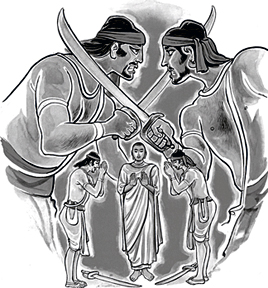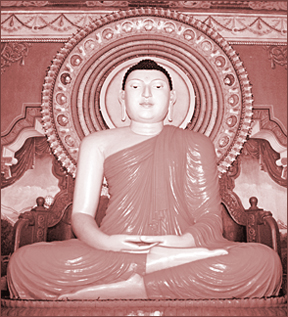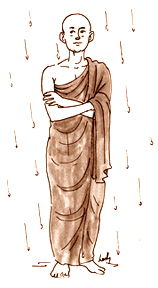|
Buddhist spectrum
Observing the right precept
Ven. Maharambawewe Palitha Thera
Observation of precepts is the summum
bonum of Buddhism. It is one vital way to achieve the ultimate goal in
Buddhism, Nibbana. However many Buddhists observe precepts only on Poya
days.
Observance of Sila on the full moon day is approved by the Buddha on
request of Visakha, a great lady devotee at the time. There was no
observance of Sila as such earlier.
 It
is inherited from Jainism, though not on ethical basis. In Jainism it
was merely ritualistic and woeful. It
is inherited from Jainism, though not on ethical basis. In Jainism it
was merely ritualistic and woeful.
The Sila was practised Jainism due to increase and decrease of the
moon. When the stars increase, they increase taking food little by
little and on full moon day, they take a maximum amount of food.
Then next day the moon starts to decrease, and they practice to
decrease of taking food little by little due to the decrease of the
moon.
They don't take any food on Amavaka, waning moon. They spend this day
without any food. This woe is taught in Jainism as Candrayana vruta (The
woe of the moon).
According to Buddhism there is no ethical value in this practice
though it is an important teaching in Jainism. The Buddha added an
ethical value to this observance and clearly pointed out the method of
spending this day fruitfully. It is named in Buddhism as uposatha.
This is not only important to lay people but also it is very
important to Buddhist monks and nuns. They have to do special Vinaya
Kamma on this day.
At one time the Blessed One was living in the palace of Migara's
mother in Savatthi. The mother of Migara on that full moon day
approached the Blessed One, worshipped and sat on a side.
Then she said to the Blessed One that she has observed the eight
precepts. Then the Buddha preached her three kinds of observances on the
full moon day. These three kinds of observances follow:
The observance of the cattle herd,
The observance of the Niganthas,
The observance of the Noble Ones.
This Dhamma discourse, preached by the Buddha to Visakha, the great
lady devotee of the Buddha, is included in Maha Vagga, Tikanipatha in
Anguttara Nikaya. It is named as Visakhoposatha Sutta. Now we examine
this Dhamma discourse with explanation.
The observance of the cattle herd
It is just like the cattle herd that returns to their owner in the
evening. The owner reflects: 'today the cattle grazed in these and these
places and drank water in these and these places and tomorrow the cattle
will graze in these places and drink water in these places.'
Visakha, in the same manner a certain one having observed the eight
precepts reflects: 'Today I ate these and these eatables and drank these
and these nourishing drinks. Tomorrow I will eat these and these
eatables and drink these and these nourishing drinks.' Thus he spends
the day with a mind overcome with greed and covetousness. Visakha, this
is the observance of the cattle herd, it is not of great fruit, good
results, great splendour and a vast spread out.
The observance of the Niganthas
The Niganthas instruct their disciples thus: Come! Good man, do not
punish living things in the eastern direction close up to 700 miles. Do
not punish living things in the western direction close up to 700 miles.
Do not punish living things in the northern direction close up to 700
miles. And do not punish living things in the southern direction close
up to 700 miles.
Thus the observance is with kindness and compassion to some and
without kindness and compassion to some. A certain one on the full moon
day gives his disciples this observance: Come! Good man.
Pull out all your clothes and tell. By this I have no desires for any
place or anything and I have no clinging to any place or thing.
His mother and father know this is our son and he too knows this is
my mother and father.
His wife and children know this is my husband and this is our father
and he too knows this is my wife and children. His slaves and workmen
know this is our master and he too knows these are my slaves and
workmen.
Thus at the time he observes all precepts he refrains from telling
lies. At the end of that night he partakes of his wealth even before it
is offered to him.
This is the refrain not to take the not given. Visakha, this is the
observance of the Niganthas, it is not of great fruit, good results
great splendour and a vast spread out.
The observance of the Noble Ones
It is the methodical cleaning of the defiled mind. Visakha, how is
the methodical cleaning of the defiled mind? Here Visakha, the noble
disciple recollects the Thus Gone One: `That Blessed One is worthy,
rightfully enlightened, endowed with knowledge and conduct, well gone,
knower of the worlds, the incomparable tamer of those to be tamed, the
teacher of gods and men, enlightened and blessed.'
When recollecting the Thus Gone One his mind brightens up and joy
arises and defilements in the mind fade.
Visakha, it is like the dirty head which gets a methodical cleaning.
Visakha, how does the dirty head get a methodical cleaning? With
paste, clay, water and the suitable efforts of a man, the dirty head
gets a methodical cleaning.
This is one of the methods that used in ancient time to clean the
dirty head. In the same manner the defiled mind gets a methodical
cleaning.
Greatest reformer ever born
N. G. Sarathchandra
The world was in chaos, since there
was no firm philosophy. Priests had diverse opinions and mostly the evil
work was the order of day. It was an era that needed a firm reformer,
and he happened to be the Buddha.
Before the 6th century before Christian Era, religion was forgotten
in Northern India and Nepal. The arrogant teachings of religious groups
such as Vedas were terrified into the background. Dishonest priests
traded on religion and cheated the people in a variety of ways and
collective wealth for themselves. They were quite irreligious
themselves. In the name of religion, people followed in the footsteps of
the cruel priests and killed innocent animals and did various
sacrifices.
|

The Buddha’s social reforming shaped history. Picture by Saman
Sri Wedage |
The country was in dire need of a reformer of the Buddha's calibre.
At such a critical period, when there were cruelty, degeneration and
unrighteousness everywhere, a reformer was born.
He was Prince Siddhartha born to put down priest-craft and animal
sacrifices, to save the people and disseminate the message of equality,
unity, peace and harmony.
Women given equal status
The Buddha was the great communicator. His teachings arrived at the
right moment when everyone could take control of their spiritual
destiny, meditate and achieve enlightenment.
The principle that people should act for themselves, rather than
succumbing to the actions of external forces, remains one of the most
attractive teachings.
He strived hard by himself in the interest of all of us. The culture
of the time ranked women far below men in importance, and at first it
seemed that permitting women to enter the community would weaken it.
The Buddha rejected this concept and said that it didn't matter what
a person's status in the world was or what their background or wealth or
nationality might be.
He Buddha asked his followers not to take his word as true, but
rather to test the teachings for themselves. In this way, each person
decides and takes responsibility for their own actions and
understanding.
Life and times of a reformer
Prince Siddhartha was born into a royal family in Lumbini, now
located in Nepal, in 563 BC on full moon Poya day called Vesak. His
father was King Suddhodana and his mother was Queen Mahamaya. On the day
he was born lotus blossoms rose in his footsteps.
They named him Siddhartha, which means 'he who has attained his
goals'.
When consulted Asita, a well-known soothsayer, concerning the future
of his son by King Suddodana, Asita announced that prince would be one
of two: He could become an emperor.
Or he could become a great sage and savior of humanity. So the king
was eager to see his son becoming a king and was determined to shield
the prince from anything that may cause him to take up the religious
life.
Thus the prince Siddhartha was kept in a three palaces built for
three seasons: winter, summer and autumn.
He was further prevented from experiencing the ordinary life. He was
not permitted to see the elderly, the sickly, the dead, or anyone who
had dedicated themselves to spiritual practices. Only beauty and health
surrounded Siddhartha in his kingdom and a luxurious life.
Observing the reality
Siddhartha grew up to be a strong and handsome young man.
As a prince of the warrior caste, he was trained in the arts of war.
When he became 16, he won the hand of a beautiful princess Yashodhara of
a neighboring kingdom by beating all competitors at a variety of sports.
Siddhartha grew increasingly restless and curious about the world
beyond the palace walls, when he continued living in the luxury life.
He insisted and got permission to see his people and his lands
outside the palace.
The king carefully arranged that Siddhartha should still not see the
kind of suffering which would lead him to a religious life, and ordered
that only young and healthy people should greet the prince.
When prince went out of his palace to see his kingdom, he
accidentally saw an old man, a sick person and a dead body within three
days.
Amazed and confused, he chased after them to find out what they were.
And he inquired his friend Channa the meaning of all these things, and
Channa explained to him of the simple truths that Siddhartha should have
known all along.
Getting rid of distress
After many days of contemplation and distress, Siddhartha visited the
city for the fourth time, he saw a happy man wearing an orange coloured
robe.
He asked Channa, "Who is this man wearing an orange robe? His hair is
shaved off. Why does he look so happy? How does he live and what does he
do for a living?"
Answered Channa: "That is a monk; he lives in a temple, goes from
house to house for his food and goes from place to place telling people
how to be peaceful and good." The prince felt very happy and he thought,
"I must become one like that".
So at the age of 29, Siddhartha came to realize that he could not be
happy living as he had been. He had discovered suffering, and wanted
more than anything to discover how one might overcome suffering. During
the period of 13 years in his luxuries life, he realized that wealth and
luxury did not guarantee happiness, so he explored the different
teachings religions and philosophies of the day, to find the key to
human happiness.
Buddhist prose :
Wading waters
Sachitra MAHENDRA
Men, women and children have found it hard to tread on this
knee-length flood. Cars and trishaws are pulled up. Passengers are on a
desperate attempt to alight into water. Furniture once held in high
admiration now floats on. Top stories of adjoining buildings shelter
white-collar employees who idle away by windows trying to grasp this
whole scene. The rains had not ceased either, so it seemed.
|

Flood facing the cemetery in Borella.
Picture by Saman Sri Wedage |
Aravinda was gazing out of the window, and did the smiling to a
passer by or two. Suddenly his mind was elsewhere unbeknown to himself.
Isn't this the murugasan varusava, the apocalyptic downpour augured in
ancient Buddhist scriptures, he thought musingly. For all appalling
things the man did to mother earth, he deserves no less.
For a moment he pictured Dhaniya and the Buddha. They both had no
grieving with rains. They both had a fulfilled life; Dhaniya had a
comfortable well-built mansion, and the Buddha had crushed down this
house of living cycle. But Aravinda has done none. He could not possibly
tell the rain god to go ahead and rain as he wishes. He is not that
strong to brave the odds. He is too feeble to put up with the sight of
people left helpless in rain.
Aravinda gazed out of the window once more. Just a moment ago the bus
made a dash across over the flood, but now the driver had no option but
kill the engine. He could not make it further off. Aravinda now has to
bank on foot. He missed the usual sight of domineering three wheelers
and motor bikes. What the waters can do, amazing he thought.
There were yet a few more miles to go for the next bus stop.
Hopefully that strip of the highway should be clear when he reaches
there. He had his black denim folded up to knees, but still had to look
out for possible unattended manholes. How am I going to cross this
flood, he thought, feeling the damp chill through the sandals - luckily
he wore no shoes that day.
Ogha Tharana - crossing over the flood! He recalled the Sutta in tiny
portions. A deity asks the Buddha the way he crossed over the flood.
Those words the Buddha uttered in response carried everything Aravinda
hears and sees right now. This life, too, is a flood. It's full of
manholes that remain mostly invisible. The wayfarer has to be on
constant alert for such pitfalls. Aravinda took the middle path - most
unattended manholes are in the edge of the way.
Isn't it a strange reminder of a fact? We all know this life is full
of pitfalls, and yet how greedily do we wallow in the same shoddy
waters?
Aravinda looked around and realized he was not alone thinking twice
or thrice before crossing over the flood-turned-pond. Unattended
manholes are a result of ill-maintained road system. Exactly so, this
Samsara cycle, too, is not properly maintained.
He has had enough of thinking twice. Aravinda took the first step
over the flood. He felt icy. That made him a little scared, if he would
catch cold later. Rainwater is clean, no doubt. But you never know how
it will be when it is mixed with sullied stuff.
Good coincidence with mind - or is it resemblance of facts? How clean
it was at first. You could spot anything underneath that crystal clean
layer of water. But everything is impermanent. Everything has to change.
Even the waters have to get along with muddy matter - willing or
unwilling, that's the fate. Ever since our births we have been at it
too. We keep on gathering information, knowledge or whatever, ignorantly
griming our crystal clean mind.
Not quite awkward, thought Aravinda stepping out of the pond. These
are actually good omens. Just what the Buddha said in Devaduta Sutta:
when you see a man suffering let it not slip by. Don't cast off it as an
ill-omen. Let it dread your heart no end, and it is time you made haste
doing more and more meritorious deeds.
Rain was ceasing little by little. Aravinda's gaze roamed around the
scene - seething sore, but yet, in a way a cup of strength - for another
good while. Everything and everyone faded in and out at length. Dhaniya,
the Buddha, heavenly messengers, they all of them emerged once again in
a montage.
He walked a great deal, immersed and basked in the montage. It cost
him some effort, but finally he could get into another bus. The road
ahead was clear, at least that was so in a distant view. Things may be
different when the flood is drained empty.
When the world gets back to normalcy, it no longer needs to worry
about wading waters.
Cry out O rain!

Sky soothingly fearful
Leaves fall down
Breeze damp
Drizzle brisk
Everything fulfilled
Everything is set
Cry out
O rain
Cry out as loud as you long.
SM
Deathless property
This was said by the Blessed One, said by the Arahath, so I have
heard: "There are these three properties. Which three? The property of
form, the property of formlessness, and the property of cessation. These
are the three properties."
Comprehending the property of form,
not taking a stance in the formless,
those released in cessation
are people who've left death behind.
Having touched with his body
the deathless
property free
from acquisitions,
having realized the relinquishing
of acquisitions,
fermentation-free,
the Rightly
Self-awakened One
teaches the state
with no sorrow,
no dust.
- Itivuttaka, translated by Thanissaro Bhikkhu.
|



